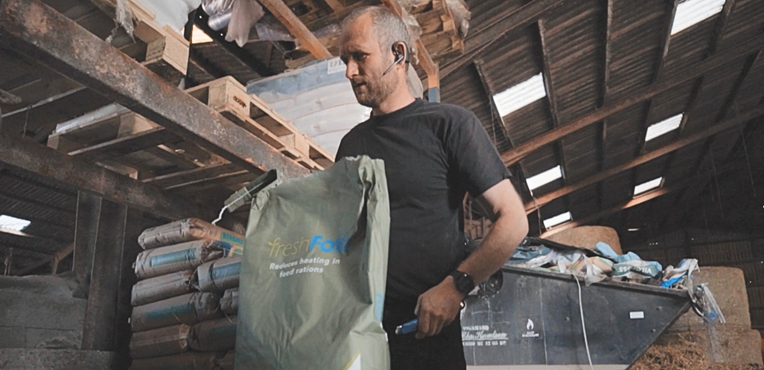FreshFoss – improves aerobic stability of Total Mixed Ration
The Vilofoss product FreshFoss TMR was found to be significantly superior in terms of improving the aerobic stability of TMR, compared to propionic acid, sodium benzoate and Salvana TMR. The following outlines the main conclusions of the test.
The test was performed on a ration composed by corn silage (46.1%), canola cake and meal (25.7%), grass-clover silage (18.4%), caustic rye (8.5%), mineral premix, and salt (1.3%). The ration was added 9 L water/animal.
Simple palpation test shows differences in efficiency
Evaluating the quality of the leftover with a simple palpation test indicated differences between treatments (Table 1). Leftovers of TMR treated with propionic acids and sodium benzoate were found to be warm 3 out of 3 days. Leftovers from Salvana were found to be warm 2 out of 3 days, and not warm 1 out of 3 days. Only the leftovers from FreshFoss were found to be “not warm” during all test days.
|
Treatment day |
Propionic acid |
Sodium benzoate |
FreshFoss |
Salvana TMR |
|
July 25 2018 |
Slightly warm |
Slightly warm |
Not warm |
Slightly warm |
|
July 27 2018 |
Slightly warm |
Slightly warm |
Not warm |
Slightly warm |
|
Aug 1 2018 |
Slightly warm |
Slightly warm |
Not warm |
Not warm |
Stability of silage and TMR can be improved
FreshFoss was the only product to significantly increase the aerobic stability of TMR (Chart 1). Stability of corn silage (9 h) had only half the stability observed for structuring mix (19 h). Combining corn silage and structuring mix, the stability was reduced to the level of corn silage (8 h). Aerobic stability of TMR treated with propionic acid and sodium benzoate was very similar (11-14 h). Only FreshFoss showed a significant (p < 0.05) improvement in aerobic stability, compared with Control and all other additives.

Chart 1. Aerobic stability of corn silage, structuring mix and TMR shown as the number of hours for centre temperature to increase by 2.5 oC, relative to chamber temperature
Growth of aerobic bacteria and yeast
Only FreshFoss was observed to have an impact on aerobic stability. With FreshFoss, the increase in bacteria and yeast was numerically lower compared to the effects of incubation in Control and samples treated with other additives.
|
Aerobic germ (log10 CFU/g) |
Yeast (log10 CFU/g) |
Mold (log10 CFU/g) |
|
|
Corn silage |
6.5 ± 0.2 |
3.9 ± 1.2 |
3.0 ± 0.3 |
|
Corn silage – 48 h 20 °C |
7.9 ± 0.4 |
8.0 ± 0,1 |
- |
|
Structuring mix |
6.5 ± 0.3 |
5.4 ± 0.4 |
2.7 ± 0.2 |
|
Structuring mix – 48 h |
> 8.4 |
7.6 ± 0.2 |
- |
|
TMR |
6.5 ± 0.3 |
5.0 ± 0.9 |
3.1 ± 0.2 |
|
TMR – 48 h 20 °C |
> 8.4 |
8.1 ± 0.1 |
- |
|
TMR – propionic acid (3 L) - 48 h 20 °C |
8.0 ± 0.4 |
7.5 ± 0.3 |
2.3 |
|
TMR – sodium benzoate (1 kg) - 48 h 20 °C |
8.4 ± 0.1 |
7.8 ± 0.2 |
2.2 ± 0.2 |
|
TMR – Salvana TMR (1 kg) - 48 h 20 °C |
8.0 ± 0.4 |
7.7 ± 0.4 |
2.0 |
|
TMR – FreshFoss (1 kg) - 48 h 20 °C |
7.4 ± 0.2 |
7.1 ± 0.3 |
2.3 ± 0.3 |
Conclusions
- When comparing propionic acid (3 L), sodium benzoate (1 kg/t), Salvana TMR (1 kg/t) and FreshFoss (1 kg/t), FreshFoss had the greatest effect.
- Farmers should consider commercial products, when detecting a need for prevention of aerobic spoilage of TMR.
- FreshFoss is easy to handle, does not require HACCP, and has a strong biological effect. The product was found to be superior in terms of biological effect.
- A simple palpation test of leftovers of TMR is a powerful test for detecting problems with aerobic spoilage of TMR.
Sources:
Kristensen, NB. Effects of additives to improve aerobic stability of TMR.







